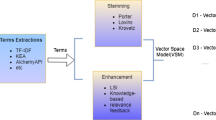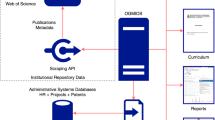Abstract
Most researchers establish research directions in their study of new fields by providing expert advice or publishing expert papers. The existing academic search services display papers by field but do not provide experts by field. Therefore, researchers are left to judge experts in each field by analyzing the papers for themselves. In this paper, we design and implement an expert search system based on papers that have been published in the academic societies. The academic expert search system is based on a big data processing system to handle a large amount of data in academic fields. It calculates an expert score using quality and influence factors. The quality factor is calculated based on the citations, impact factor, and recentness of a paper. The influence factor is measured by the sparsity of a field and the degree of contributiveness of an author. The proposed system provides various services such as expert searches, keyword searches, the hot topics, expert relationships, and academic society statistics. By finding experts in a specific field, our system can support researchers’ research activities.


























Similar content being viewed by others
References
Google Scholar (2019) https://scholar.google.com. Accessed Dec 2019
DBLP (2019) http://dblp.uni-trier.de. Accessed Dec 2019
Research Gate (2019) https://www.researchgate.net. Accessed Dec 2019
Academia Edu (2019) http://www.academia.edu. Accessed Dec 2019
Hirsch JE (2005) An index to quantify an individual’s scientific research output. Proc Natl Acad Sci 102(46):16569–16572
Egghe L (2006) Theory and practise of the g-index. Scientometrics 69(1):131–152
Machado JT, Lopes AM (2019) Ranking the scientific output of researchers in fractional calculus. Fract Calc Appl Anal 22(1):11–26
Gollapalli SD, Mitra P, Giles CL (2013) Ranking experts using author-document-topic graphs. In: Proceedings of the 13th ACM/IEEE-CS joint conference on digital libraries, ACM, pp 87–96
Guan Z, Miao G, McLoughlin R, Yan X, Cai D (2012) Co-occurrence-based diffusion for expert search on the web. IEEE Trans Knowl Data Eng 25(5):1001–1014
Gollapalli SD, Mitra P, Giles CL (2012) Similar researcher search in academic environments. In: Proceedings of the 12th ACM/IEEE-CS joint conference on digital Libraries, ACM, pp 167–170
Tran HD, Cabanac G, Hubert G (2017) Expert suggestion for conference program committees. In 2017 11th international conference on research challenges in information science (RCIS). IEEE, pp 221–232
Sfyris GA, Fragkos N, Doulkeridis C (2016) Profile-based selection of expert groups. In: International conference on theory and practice of digital libraries. Springer, pp 81–93
Yang L, Zhang W (2010) A study of the dependencies in expert finding. In: 2010 third international conference on knowledge discovery and data mining. IEEE, pp 355–358
Zhu J, Huang X, Song D, Rüger S (2010) Integrating multiple document features in language models for expert finding. Knowl Inf Syst 23(1):29–54
Daud A, Hussain S (2012) Publication venue based language modeling for expert finding. In: Proceedings of international conference on future communication and computer technology (ICFCCT 2012), pp 19–20
Jiang X, Sun X, Yang Z, Zhuge H, Yao J (2016) Exploiting heterogeneous scientific literature networks to combat ranking bias: evidence from the computational linguistics area. J Assoc Inf Sci Technol 67(7):1679–1702
Cifariello P, Ferragina P, Ponza M (2019) Wiser: a semantic approach for expert finding in academia based on entity linking. Inf Syst 82:1–16
Li X, Watanabe T (2013) Automatic paper-to-reviewer assignment, based on the matching degree of the reviewers. Proc Comput Sci 22:633–642
Liu D, Xu W, Du W, Wang F (2015) How to choose appropriate experts for peer review: an intelligent recommendation method in a big data context. Data Sci J 14:1–11
Kale A, Kharat R, Bodkhe S, Apte P, Dhonde H (2015) Automated fair paper reviewer assignment for conference management system. In: 2015 international conference on computing communication control and automation. IEEE, pp 408–411
Zhang J, Tang J, Li J (2007) Expert finding in a social network. In: International conference on database systems for advanced applications. Springer, pp 1066–1069
Liao H, Xiao R, Cimini G, Medo M (2013) Ranking users, papers and authors in online scientific communities. arXiv:1311.3064
Amjad T, Daud A, Akram A, Muhammed F (2016) Impact of mutual influence while ranking authors in a co-authorship network. Kuwait J Sci 43(3):101–109
Le LT, Shah C, Choi E (2016) Evaluating the quality of educational answers in community question-answering. In: Proceedings of the 16th ACM/IEEE-CS on joint conference on digital libraries. ACM, pp 129–138
Pavan M, De Luca EW (2015) Semantic-based expert search in textbook research archives. In: SDA@ TPDL, pp 18–29
Ollagnier A, Fournier S, Bellot P (2018) BIBLME RecSys: harnessing bibliometric measures for a scholarly paper recommender system. In: BIR 2018 workshop on bibliometric-enhanced information retrieval
Liu L, Zuo W, Han J, Peng T (2018) DEDSC: a domain expert discovery method based on structure and content. Int J Uncertain Fuzziness Knowl-Based Syst 26(04):583–599
Zaharia M, Chowdhury M, Franklin MJ, Shenker S, Stoica I (2010) Spark: cluster computing with working sets. HotCloud 10(10–10):95
Khan S, Liu X, Shakil KA, Alam M (2017) A survey on scholarly data: from big data perspective. Inf Process Manag 53(4):923–944
Khan S, Shakil KA, Alam M (2016) Cloud-based big data management and analytics for scholarly resources: current trends, challenges and scope for future research. arXiv:1606.01808
Simović A (2018) A big data smart library recommender system for an educational institution. Lib Hi Tech 36(3):498–523
Xu Z (2017) The analytics and applications on supporting big data framework in wireless surveillance networks. Int J Soc Humanist Comput 2(3–4):141–149
Robertson SE (1977) The probability ranking principle in IR. J Doc 33(4):294–304
High Charts (2019) http://www.highcharts.com. Accessed Dec 2019
Shvachko K, Kuang H, Radia S, Chansler R (2010) The hadoop distributed file system. In: MSST pp 1–10
HBase (2019) http://hbase.apache.org. Accessed Dec 2019
PostgreSQL (2019) https://www.postgresql.org. Accessed Dec 2019
Acknowledgments
This work was supported by the National Research Foundation of Korea (NRF) grant funded by the Korea government (MSIT). (No. 2019R1A2C2084257, NRF-2017S1A5B8059946), by Institute of Information & Communications Technology Planning & Evaluation (IITP) grant funded by the Korea government (MSIT) (No. B0101-15-0266, Development of High Performance Visual BigData Discovery Platform for Large-Scale Realtime Data Analysis), by the AURI (Korea Association of University, Research institute and Industry) grant funded by the Korea Government (MSS : Ministry of SMEs and Startups). (No. S2929950, HRD program for 2020), by the MSIT (Ministry of Science and ICT), Korea, under the Grand Information Technology Research Center support program (IITP-2020-0-01462) supervised by the IITP (Institute for Information & communications Technology Planning & Evaluation).
Author information
Authors and Affiliations
Corresponding author
Additional information
Publisher's Note
Springer Nature remains neutral with regard to jurisdictional claims in published maps and institutional affiliations.
Rights and permissions
About this article
Cite this article
Choi, D., Lee, H., Bok, K. et al. Design and implementation of an academic expert system through big data analysis. J Supercomput 77, 7854–7878 (2021). https://doi.org/10.1007/s11227-020-03446-0
Accepted:
Published:
Issue Date:
DOI: https://doi.org/10.1007/s11227-020-03446-0




